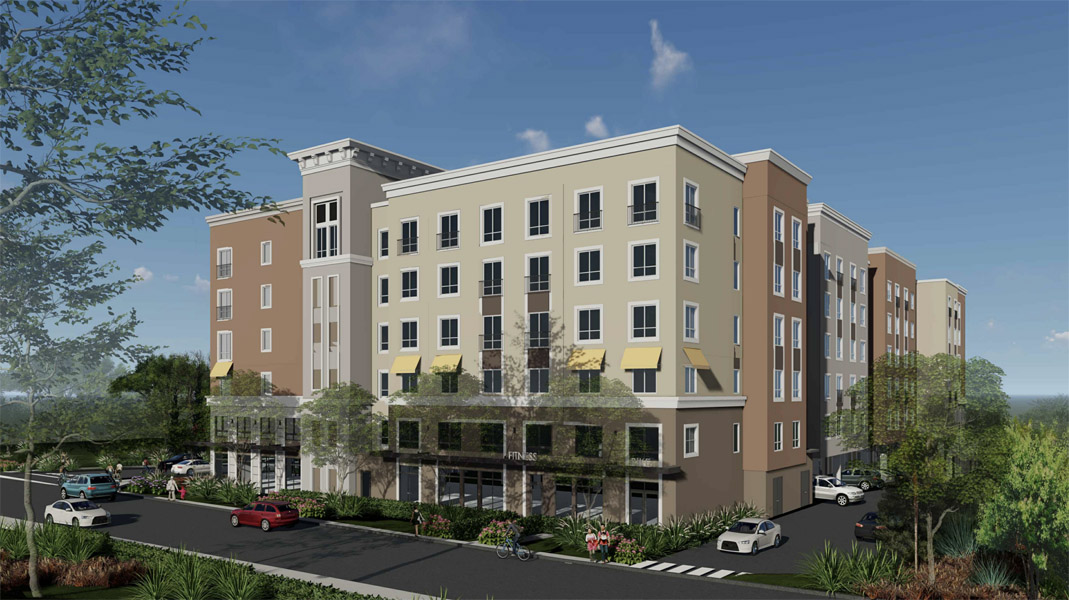Concord Council OKs 183 affordable units on former Nazarene church site

CONCORD, CA (July 22, 2024) — A stalled 183-unit, multi-family rental project will move forward after the City Council gave unanimous approval to construction – amidst state-mandated requirements and the increasing need for affordable housing.
The Ashbury, by developer Pacific West Communities, Inc., will be located at 1650 Ashbury Dr. It will feature a six-story building with studio, one-bedroom and two-bedroom units on five stories of living space, plus 99 parking stalls, a fitness gym, two podium courtyards, a clubhouse and a leasing office.
Based on a Feb. 9, 2023, Design Review Board staff report, the developer proposes landscaping adjacent to the building around the perimeter of the 1.81-acre rectangular parcel, currently owned by Church of the Nazarene. The project includes demolition of the former church’s vacant chapel and gymnasium.
The city rezoned the property for Downtown Mixed Use in 2012, and it’s part of the Transit Village near BART.
Concerns about downtown saturation
At previous meetings, councilmembers rejected the project by stating it would negatively impact the community by concentrating too much affordable housing in the central business district.
Mayor Edi Birsan said he voted in favor at the June 24 special meeting because of the risk of violating state mandates on affordable housing requirements. “The concerns I had were met in regard to the amount of money that was going to be spent in total on the project,” he noted.
The city must now accept the developer’s request to receive up to $90 million in state financing to cover construction and operational costs. Funds will not come out of city taxpayers’ money.
Despite approving construction, Birsan still has mixed feelings.
“The concern that we do not increase stress on low-resource areas is valid,” he said. “We recently went through a review process called the Affirming Affordable Housing Plan, which specifically called out the need to spread affordable housing around the city.”
Rick Judd Commons team members say the plan creates affordable housing for people with the fewest options. Nick Griffin, director of asset management, said the demand for affordable housing in Concord is high.
“Our market study for the project, undertaken for financing applications a few years ago, found that affordable multi-family properties in Concord had 99.9% occupancy,” said Griffin.
State shortage of affordable housing
When the council vetoed construction of the Ashbury months earlier, councilmembers quickly realized the state requirements for affordable housing and moved a motion forward to approve it.
“The state mandates – via the Housing Element – the number of housing units a jurisdiction needs to build from 2023-2031, and it requires the number of affordable units, too,” said Griffin. “All jurisdictions are woefully underbuilt, and I imagine Concord is, too. If I’m not mistaken, Rick Judd Commons is the first affordable housing property built in Concord in 20 years.”
The need for affordable housing goes beyond Concord’s borders.
“The housing crisis is a regional one, and the shortage of affordable housing across the Bay Area, as well as the state, is well documented,” added Griffin.
Birsan feels the same way about the importance and demand for affordable housing.
“We need housing that is more than just affordable under the current governmental standard,” said Birsan. “We need great housing at the lowest cost possible, not just the highest that the market can bear. How to do it is the big question. Currently, systemically, the only method we have is government vouchers and subsidies for construction and operational costs.”
Creating ‘well-rounded community’
As manager and organizer for EBASE (East Bay Alliance for a Sustainable Economy), Betty Gabaldon said the Ashbury will have a positive impact on the community.
“I work downtown and see several new market-rate developments boasting luxury living,” said the Concord resident. “The real negative impact on downtown is the lack of affordable housing, which has forced more and more of my Concord neighbors to become unhoused. Concord needs more affordable housing in its neighborhoods and downtown.”
The nonprofit EBASE works to advance economic, racial and social justice by building a just economy, based on good jobs and healthy communities.
“It is essential to the well-being of families who are currently stressed out and working multiple jobs to keep a roof over their heads,” Gabaldon said. “Affordable housing creates a more diverse and well-rounded community – where our teachers, grocery store workers, child-care providers and our seniors and those on fixed incomes can all afford to stay in our city.”
Griffin believes a home is considered “affordable” if the household pays about 30% of its income toward rent and utilities.
“Our region’s housing costs have outpaced local incomes for several years, and not enough new housing was developed in the past decade to meet current demand,” said Griffin. “The housing crisis is a complex problem. Building new, affordable housing is a critical component of the solution.”

Charleen Earley
Charleen “Charlie” Earley is a 26-year freelance writer for Bay Area publications and beyond. She teaches journalism mass media communication classes at Diablo Valley College and San Ramon Campus. She’s also a stand-up comic, a mom, “Grammy” to three grandchildren and two rescue tuxedo cat sisters.
